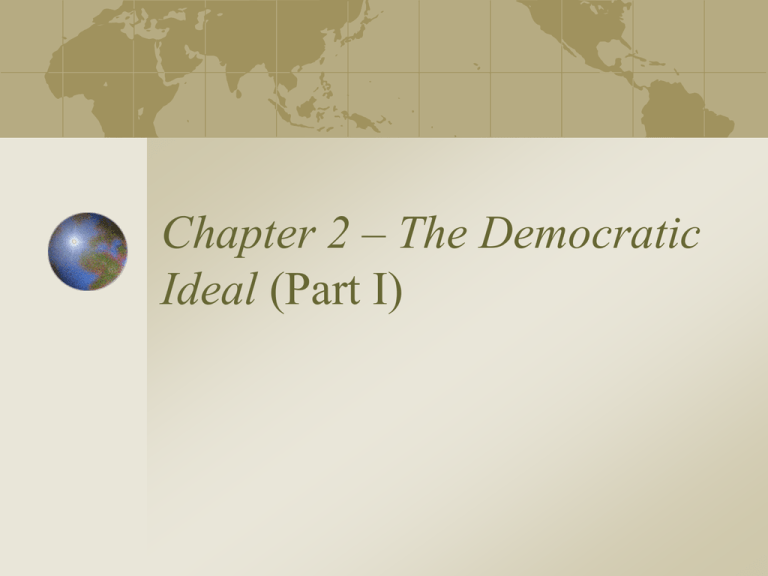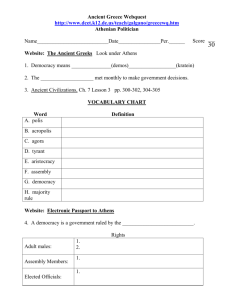
Chapter 2 – The Democratic
Ideal (Part I)
Democracy
Demos = “the people”
Kratein = “to rule”
Democracy = “Rule by the people”: the idea
that ordinary people want to rule themselves
and are capable of doing so.
Democracy and the Democratic Ideal
We trace the emergence of the concept to
Pericles’ and Socrates’ celebration of the
Athenian ideal of democracy, even though
Athens’ citizen-rulers were only
constituted by 1/10 of the population.
Democracy and the Democratic Ideal
Democracy is an IDEAL of political
participation and involvement in the
making of laws.
EVEN THOUGH the concept EMERGED in
the ancient political world, Aristotle and
Plato were skeptical of democracy. They
feared mob rule, an over-emphasis on
short term benefits, and political chaos.
Nonetheless, the IDEAL of democracy was
born.
Athenian Democracy
The idea of democracy in ancient Athens was
associated with public spirited citizens (polites),
rather than individuals pursuing their own
private liberty (idiotes).
Public deliberation would create in citizens a
habit of thinking about the public good, rather
than about their own personal gain.
Reached its high point under the rule of Pericles
between 461 – 429 BC
Declined at the end of 5th Century BC
Coincided w/ emergence of political philosophy
Athenian Democracy (con’t)
Athenian democracy consisted of an
assembly of all male citizens who were all
considered lawmakers. Women, foreigners,
and children of foreigners were not
considered citizens.
Athenian “democracy”
Direct Democracy, rather than
Representative Democracy
Highly exclusive of the vast majority who
were not citizens
Certain principles of democratic theory
receive their first airing among the
minority who did participate
Direct vs. Representative Democracy
Direct Democracy
Athens in the 5th Century BC: Rule by the people
exercised directly in an open assembly
No Elected Representatives
Not compatible with republican principles
Representative Democracy
Modern democracies today: Rule by the people,
exercised indirectly through representatives
selected by the people
Compatible with republican principles
Aristotle’s Six-fold Classification of
Government
In Whose Interest?
Rule By
The Public
The Ruler(s)
Monarchy
Tyranny/Totalitarianism
THE FEW
Aristocracy
Oligarchy
THE MANY
Polity (Republic)
Democracy
ONE
Source: Adapted from Ball, Terence and Richard Dagger, Political Ideologies and the Democratic Ideal,
5th ed. (New York: Pearson/Longman): 22.
Ancient Rome and the Renaissance
The “republic” of ancient Rome ( c. 500 BC – 44 BC)
drew upon Aristotle’s idea of polity. The Romans
called their mixed form of government a Republic.
Like Aristotle’s Polity, Republicanism required
mixed government, rule of law, and virtuous citizenry.
Titus Livius, the Roman historian of the Augustan
Era (early years of the Roman Empire) celebrated
the virtuous citizenry and high moral Roman national
character.
Machiavelli drew upon Livy’s writings in his
Discourses, which provided the first modern
doctrine of republicanism.





